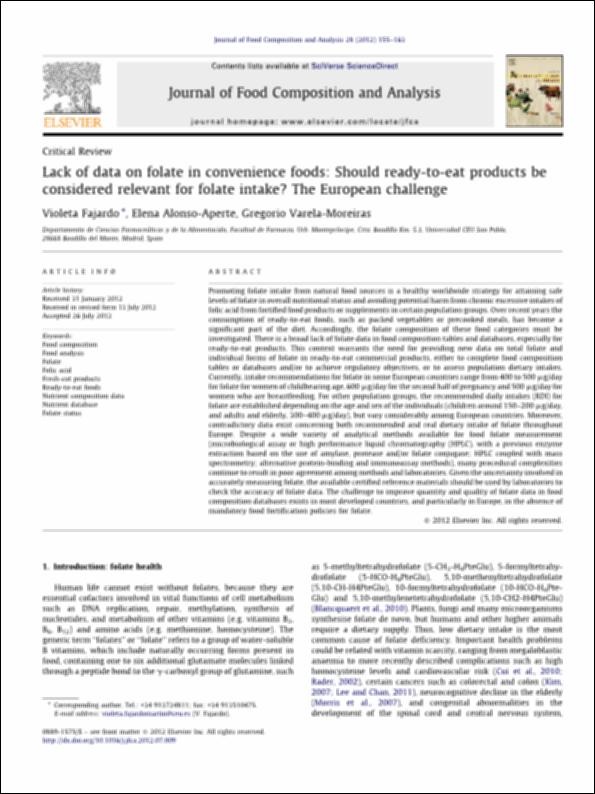Please use this identifier to cite or link to this item:
http://hdl.handle.net/10637/14109Lack of data on folate in convenience foods : Should ready-to-eat products be considered relevant for folate intake? The European challenge.
| Title: | Lack of data on folate in convenience foods : Should ready-to-eat products be considered relevant for folate intake? The European challenge. |
| Authors : | Fajardo Martín, Violeta Alonso Aperte, Elena Varela Moreiras, Gregorio |
| Keywords: | Food composition; Food analysis; Folate; Folic acid; Fresh-cut products; Ready-to-eat foods; Nutrient composition data; Nutrient database; Folate status |
| Abstract: | Promoting folate intake from natural food sources is a healthy worldwide strategy for attaining safe levels of folate in overall nutritional status and avoiding potential harm from chronic excessive intakes of folic acid from fortified food products or supplements in certain population groups. Over recent years the consumption of ready-to-eat foods, such as packed vegetables or precooked meals, has become a significant part of the diet. Accordingly, the folate composition of these food categories must be investigated. There is a broad lack of folate data in food composition tables and databases, especially for ready-to-eat products. This context warrants the need for providing new data on total folate and individual forms of folate in ready-to-eat commercial products, either to complete food composition tables or databases and/or to achieve regulatory objectives, or to assess population dietary intakes. Currently, intake recommendations for folate in some European countries range from 400 to 500 mg/day for folate for women of childbearing age, 600 mg/day for the second half of pregnancy and 500 mg/day for women who are breastfeeding. For other population groups, the recommended daily intakes (RDI) for folate are established depending on the age and sex of the individuals (children around 150–200 mg/day, and adults and elderly, 300–400 mg/day), but vary considerably among European countries. Moreover, contradictory data exist concerning both recommended and real dietary intake of folate throughout Europe. Despite a wide variety of analytical methods available for food folate measurement (microbiological assay or high performance liquid chromatography (HPLC), with a previous enzyme extraction based on the use of amylase, protease and/or folate conjugase; HPLC coupled with mass spectrometry; alternative protein-binding and immunoassay methods), many procedural complexities continue to result in poor agreement among methods and laboratories. Given the uncertainty involved in accurately measuring folate, the available certified reference materials should be used by laboratories to check the accuracy of folate data. The challenge to improve quantity and quality of folate data in food composition databases exists in most developed countries, and particularly in Europe, in the absence of mandatory food fortification policies for folate. |
| Description: | En: Journal of Food Composition and Analysis. e-ISSN. 1096-0481. v. 28, (2012) : 155-163 |
| URI: | http://hdl.handle.net/10637/14109 |
| Rights : | http://creativecommons.org/licenses/by-nc-nd/4.0/deed.es |
| Issue Date: | 26-Jul-2012 |
| Center : | Universidad San Pablo-CEU |
| Appears in Collections: | Facultad de Farmacia |
Items in DSpace are protected by copyright, with all rights reserved, unless otherwise indicated.


